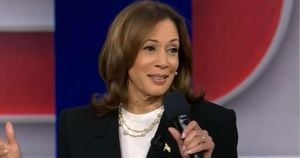Donald Trump recently held what was dubbed his "closing argument" rally at Madison Square Garden, drawing large crowds and igniting heated discussions on various topics ranging from immigration to race. The event was anything but conventional, featuring inflammatory speeches, provocative humor, and dividing sentiments around Trump's unfiltered comments. The atmosphere reflected his controversial campaign style, reminiscent of earlier electoral battles but amplified by the late-night focus on his political enemies.
During the rally, Trump delivered crushing critiques directed at Vice President Kamala Harris and used humor to attack his political adversaries. His supporters reveled as he mocked Harris, calling her "the Antichrist" and possibly even alluding to her heritage as he claimed, "Harris could be the first Samoan, Malaysian, low-IQ, former California prosecutor ever to be elected president." The audience applauded with gusto as he taunted his rivals, effectively energizing his base.
A particularly disturbing moment came from comedian Tony Hinchcliffe, who made headlines for jesting about Puerto Rico being akin to "a floating island of garbage." This comment led to backlash, even within Trump's camp. GOP Chair Ángel Cintrón of Puerto Rico went public, stating he wouldn't vote for Trump if the former president didn't apologize for Hinchcliffe's remarks. Cintrón’s comments highlighted the nuanced relationship Puerto Rico has with the electoral process since its residents can't vote for president directly, affecting the island's involvement this election season.
The fallout from Hinchcliffe’s comments not only riled Puerto Rican officials but put pressure on Trump to distance himself from the offending remarks. Although the Trump campaign attempted to alleviate some backlash by stating it didn’t reflect the former president’s views, Trump himself refused to apologize. Instead, he opted to criticize Democrats, claiming improvement was necessary for turning around public perceptions and rallying support.
Meanwhile, during the chaotic hours of the rally, Trump maintained his narrative of victimhood, accusing Biden of labeling his supporters as "garbage" and turning the comment to his advantage at subsequent rallies. This tactic, reminiscent of past electoral strategies, served to galvanize the sentiment of his staunch supporters, positioning Trump as the underdog who fights back against unfair treatment.
Attacking Harris, Trump articulated his perspective, painting her as orchestrator of chaos through her policies, emphasizing how they allegedly put criminals back on the streets and threaten public safety. Such rhetoric is central to Trump’s strategy of framing the election as one between national security and chaos, attempting to pull moderate voters toward his cause at the expense of Harris.
Indeed, the environment during and after the rally was charged, underscoring long-standing theories about Trump’s supporters being captivated by his unapologetic and aggressive political style. Critics argue this approach reflects broader trends of populism, where emotion and allegiance overshadow substantive political discussion.
On the flip side, Harris has been actively trying to carve out her narrative separate from Biden’s "garbage" gaffe, emphasizing unity and positive vision for the future of the country. She has aimed to bridge divides within the party by promoting inclusive policies to alleviate economic hardships facing Americans. Harris also utilized star-studded endorsements to amplify her message, with celebrities joining her calls for early voting and broader participation.
The stark contrasts between rallies become more evident when analyzed through the lens of crowds and energies. Trump's rally showcased intense, roaring declarations fueled by animosity and reactive commentary, whereas Harris's events leaned toward policy discussions, attempting to provide solutions rather than mere insults. While Trump’s gathering felt like raucous entertainment with hate speech and divisive humor taking center stage, Harris's endeavors focused more on painting her ambitions for America and pointing to key campaign issues like healthcare and social equity.
The media has also been active post-rally, delving deep to interpret and explain the ramifications of Trump's words, especially concerning the long history of racism and xenophobia embedded within some of his comments. Political analysts noted the heavier consequences of pitting communities against each other, particularly among minority groups, as seen during the rally where speakers utilized derogatory language toward LGBTQ+ individuals and Black communities.
Trump's continual reliance on these mocking portrayals raises alarm about the normalization of hate-filled speech within political discourse. Intellectuals have warned against complacency, invoking the historical resonance of mass gatherings fueled by incendiary rhetoric — underscoring the need for vigilance against rhetoric intending to dehumanize.
Nevertheless, as the campaign progresses and Election Day approaches, one can't ignore core sentiments and fear surrounding who might emerge victorious. With early voting dramatically favoring Harris's campaign, Trump and his allies remain focused on shoring up support from undecided voters or those disenchanted with the Democratic party, even as controversy looms over comments and affiliations made earlier on the campaign trail.
Looking at larger patterns, both candidates are signaling their strategies loud and clear as they seek to navigate the turbulent waters of American politics. Trump seems bent on framing the political struggle as one of survival from perceived radical threats and internal decay, often using incendiary humor and demagoguery to draw applause from loyal supporters. Meanwhile, Harris aims to offer more measured, optimistic expressions of governance, though she faces significant challenges repositioning her narrative against the firestorm often stirred by Trump’s unapologetic assertions.
Both the rallies and increasing public sentiments reflect the growing urgency of voter engagement, especially among marginalized communities. With issues of race, class, and identity at the forefront, it's clear each side is seeking to avert potential voter apathy, drawing distinctions not only between parties but between moral frameworks of governance and societal values.
The election is set on razor-thin margins, and with the latest polling numbers hinting at potential outcomes, every rally, comment, and vote carries additional weight. For now, rallies continue to function as platforms for setting narratives — but as citizens observe and react, it's the long-term impact of words and actions during these fervent times that's likely to be felt long after the last vote is cast on November 5.



